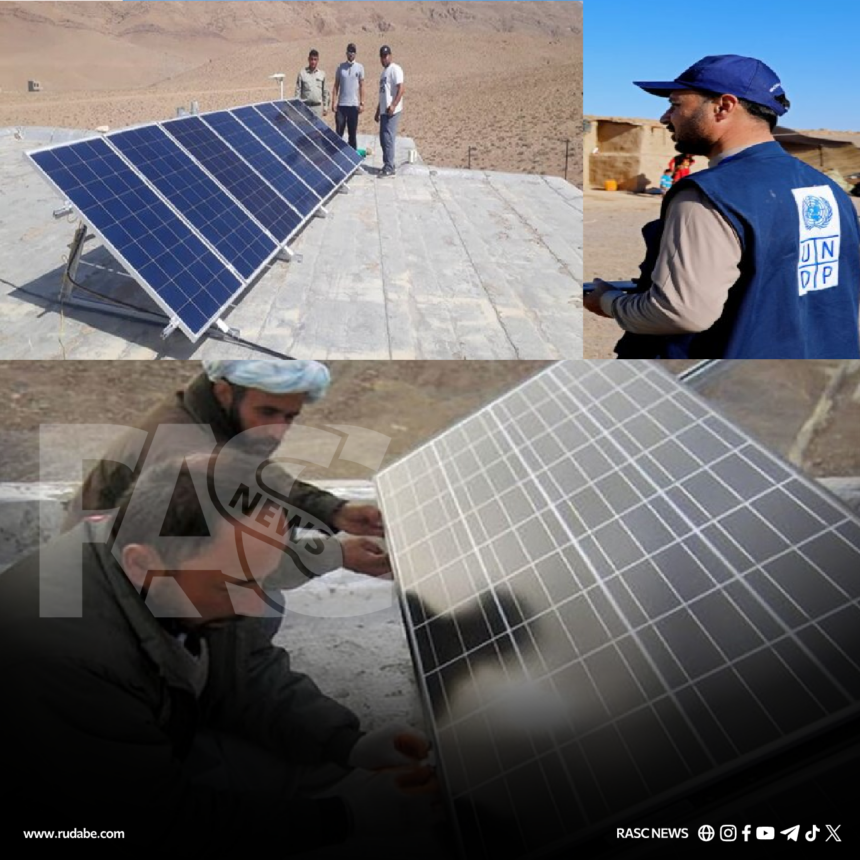RASC News Agency: The United Nations Development Programme (UNDP) has unveiled a landmark initiative that is reshaping Afghanistan’s energy landscape through the introduction of clean, sustainable, and community-driven solar power systems. The project, financed by the Government of Japan, aims to strengthen vital public services, bolster local economies, and empower women entrepreneurs who continue to persevere under the Taliban’s regressive rule.
According to UNDP’s statement released on Tuesday, October 21, the project has installed solar panels across remote and underserved regions of Afghanistan, providing consistent, renewable energy to areas long abandoned by the de facto Taliban authorities. This initiative represents not only an environmental achievement but also a powerful humanitarian response to the regime’s catastrophic mismanagement of infrastructure and public welfare.
So far, 334 healthcare centers have been connected to sustainable solar power, ensuring reliable electricity for medical facilities that once struggled to operate amid constant blackouts and fuel shortages. Additionally, 2,000 impoverished families have received solar energy kits, granting them access to light, communication, and basic security necessities that have become unattainable for millions under the Taliban’s collapsing economy and institutional corruption.
UNDP emphasized that Afghanistani women entrepreneurs have emerged as central actors in this transformation. Despite facing draconian Taliban restrictions that bar them from education, employment, and public life, many women have found new opportunities through solar-powered enterprises. These initiatives not only generate income but also symbolize defiance a reclaiming of agency and hope in the face of one of the most oppressive gender regimes in modern history.
The agency further noted that investing in solar energy yields multiple long-term benefits: it reduces carbon emissions, cuts operational costs, and enables communities to reinvest savings into essential sectors such as healthcare, education, and local commerce. “Clean energy,” UNDP stated, “is more than technology it is empowerment, resilience, and survival for communities left in the shadows.”
Development analysts argue that the UNDP’s initiative highlights a profound contrast: while the Taliban have plunged Afghanistan into darkness both literal and figurative international humanitarian actors are striving to illuminate its future. By channeling renewable energy into marginalized areas, UNDP not only restores electricity but also revives a sense of human dignity and collective purpose.
Yet, experts warn that these gains remain fragile. Taliban interference in aid operations, arbitrary taxation, and the regime’s habit of diverting resources for its own patronage networks continue to threaten humanitarian efforts. Many fear that without firm international safeguards and independent oversight, even successful projects risk being co-opted or dismantled by the Taliban’s predatory governance.
Nevertheless, UNDP’s solar program stands as a testament to the power of global cooperation and local resilience. It proves that progress in Afghanistan remains possible not through the Taliban’s hollow promises of “self-sufficiency,” but through international solidarity grounded in ethics, science, and respect for human life.
As Afghanistan’s humanitarian crisis deepens, and as millions continue to live without reliable energy, this project offers a rare glimmer of optimism. In a nation suffocated by censorship, repression, and poverty, each solar panel represents more than just electricity it is an act of resistance against darkness, both political and moral.






